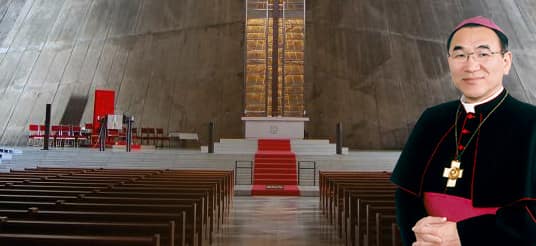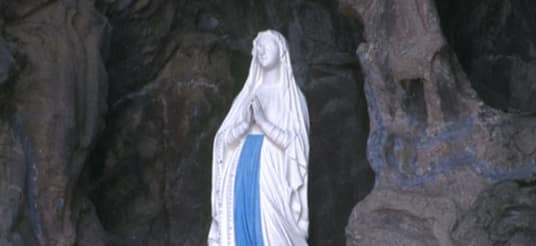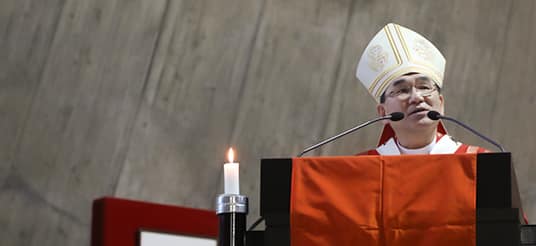Archdiocese of Tokyo

Message on the 4th Anniversary of My Episcopal Installation
On the 4th Anniversary of the Episcopal Installation of Archbishop Okada
5th September 2004
To the laity of Tokyo Archdiocese,
How the three designated diocesan priorities are progressing
I was installed as Archbishop of Tokyo on September 3rd 2000. In order to begin to address the many pastoral concerns that I had inherited from my predecessor, Cardinal Seiichi Shirayanagi, I wrote the document ‘One Step Forward-Reorganization of Parishes for Evangelization in the 21st Century’, which was promulgated on June 25th 2001. On June 29th 2002, the Reorganization Project Team, in response to my document, produced and published ‘Living Out the Gospel Mission-Proposal for One Step Forward’. After spending much time on meetings, discussions and exchanges of opinions, including Parish gatherings, I formally established 22 Catholic Mission Districts. In addition to these, the following offices were established in the Diocesan Curia, Office of General Administration, Office for Evangelization and Pastoral Care, Office of Social Concerns, Office of Communications, and a general manager was appointed to each. On January 17th 2004, I re-activated the diocesan Pastoral Council, which had not been operative for quite some time.
Three priests have been appointed to take charge of the three designated diocesan priorities that were proposed in ‘Living Out the Gospel Mission-Proposal for One Step Forward’. The assigned priests have become the key personnel for dealing with these priority tasks.
I would like to inform you now on how we have been tackling the three designated diocesan priorities and on the current situation in regard to them.
The three designated diocesan priorities that were proposed in ‘Living Out the Gospel Mission-Proposal for One Step Forward’ are;
(1) Training the laity to live out the Gospel Mission
(2) Ministering to foreign Catholics and addressing their difficulities
(3) Supporting people who suffer from spiritual or mental injury and illness
1. On ‘training the laity’
The Pastoral Council and the Presbyteral Council are now at the consultation stage regarding basic policy on ‘training the laity to live out the Gospel Mission’. Our purpose is to promote the spiritual growth of each person, whether lay, catechumen, religious, bishop, priest or deacon, who together make up the church. I believe that the fundamentals for this endeavor will be achieved through small group cooperation and sharing, and through the active organization of smaller communities. On this foundation, programs will be drawn up for promoting growth within the Catholic Mission Districts and Parish Communities, as well as programs aimed at service within the wider community.
We cannot draw up these programs perfectly in a short time, so continuing study and research will always be necessary. However it is our task to make these programs as specific and practical as possible.
2. Ministering to foreign Catholics and addressing their difficulities
With the Catholic Tokyo International Center (CTIC) as the focus, the Catholic Mission Districts, the Parish Communities and other groups are actively cooperating for this priority.
The three offices of the Catholic Tokyo International Center (Meguro, Kameido, Chiba) have been helping foreign Catholics with their difficulties both with counseling and with various forms of support. The number of contacts is over 2 thousand a year, and the number of nationalities involved is now over 20. The areas that are addressed through counseling cover all aspects of everyday life, such as residential legality (visas), marriage, divorce, medical care, welfare, children’s education, accidents etc. Recently the number of requests for assistance in cases dealing with official Recognition of Refugee Status, and from people who already have obtained the Certificate of Refugee Status has been increasing. Additional services that CTIC are able to provide, such as interpretation and translation, visiting immigration bureau and police stations to meet detained people, are also very important.
In the field of pastoral care, the diocese organizes foreign language masses and sacramental services, publishes books and pamphlets on Catholic formation for foreigners, assists foreigners to form their own local communities, and coordinates networking among the people who are in charge of ministering to foreign Catholics. In order to make this pastoral care of the foreign faithful more fruitful, the diocese has invited a Brazilian and a Filipino priest to work in Tokyo. They are from the Scalabrinian Missionary Society, which was established especially for the pastoral care of immigrants and emigrants. Looking forward to their more active cooperation, I will be taking greater interest in the details of pastoral ministry for foreign Catholics.
3. Supporting people who suffer from spiritual or mental injury and illness
Many concerns and requests were quickly brought to the attention of the priest designated with this task, as soon as his appointment was made public. Most of these approaches for consultation were by people suffering from spiritual and mental illness themselves, or by the families of these sufferers. Cases which evidenced a deep distrust of medical institutions by those being treated were conspicuous by their number. From this fact, we can begin to imagine how serious this task is.
Since February of this year, there have been 6 meetings of the Committee for Emotional and Spiritual Care. From these meetings we are learning over again that we ourselves who constitute the Church may be considered as unhealthy, and that as a ‘place of healing’ which is after all of the original essence of the church, many aspects are not functioning well. We have to make clear the distinction between ‘what the church must do’, ‘what we can do just because we are church’ and ‘what only the church can do’.
Where is the place where one can speak frankly about one’s own ‘spiritual problems’ and about ‘matters of the heart’? In reality, such places cannot be found easily. Because of this, the patients and their families are shouldering much pain on their own, closed off from the world. In the future, the church should be such a place where people can come and then for those who are suffering and their families, it will truly be a place of ‘safety and healing’.
Of course in cases where specialized treatment is required, such as dealing with critical conditions or in emergencies, people with the appropriate specialties will be needed. In tackling these issues, the diocese should fulfill the role of information center and network coordinator in developing contacts with groups and organizations that have the relevant specialties.
Tokyo Caritas House, which has a history of nearly 30 years of experience in this field, would be of great use for the diocese in working in this field.
Please check out the article in the Tokyo Diocesan News called ‘Dealing with the issue of Emotional and Spiritual Care’.
Planning for the Future
I shall now address other matters of importance to the diocese.
1. Catholic Mission Districts
A short pamphlet called ‘Guidelines for Catholic Mission Districts ’has been published. I expect that on re-reading these guidelines that you will share on your experience of implementing these policies in your own areas.
The number of invitations that I have received to joint confirmation ceremonies and similar District activities continues to increase and are very welcome. However in addition to these occasions, I also intend to visit each Catholic Mission District to increase the opportunities for greater sharing and interaction between us.
Only recently after taking almost 4 years, I have finally completed visiting each parish community in the Archdiocese. I now intend to visit each of the 22 Catholic Mission Districts in turn and ask for your assistance to bring this about. Also, I would like to create opportunities for meeting with the Catholics who form up the foreign language mass communities and to promote exchange with them.
2. Tackling the Diocesan Priorities
The three priorities are deeply intertwined. And so in dealing with one, we touch upon all three priorities.
1. How do we proceed so as to ensure the spiritual growth of all Catholics?
2. How do we make it possible for our churches to develop a supporting atmosphere that will allow people of different cultures to learn from, and to support each other?
3. How do we learn from that first group of followers of Jesus, who were essentially an assembly of suffering people, and to use what we have learnt from them into practice today?
These are the matters of great concern for us.
As for the area of Emotional and Spiritual Care, we plan to produce an interim report on practical guidelines, with contents, by December of this year.
3. On the Cathedral and Diocesan Offices
When I took over responsibility for the ‘Rearrangement of Parishes’ project from my predecessor, I came to understand this in reality as a ‘Reorganization of Parishes’. Through the process of reflection and consideration about this ‘Reorganization of Parishes’, I further came to realize that I should, rather must, consider this task as being a ‘Reorganization of the Diocese’, not just the ‘Parishes’. And then I began to think that this ‘Reorganization of the Diocese’ is intrinsically linked to the state of the Diocesan offices. Therefore I made this appeal to everyone on ‘the necessity and importance of making more relevant and strengthening the Diocesan Curia’.
This year on the 8th of December, the feast day of the Immaculate Conception, we will celebrate the 40th anniversary of the dedication of St. Mary’s Cathedral. We hope to use this occasion to think about the role of the cathedral as the center of the diocese, as well as to reconsider the use of the various buildings there.
Now, I would like all of you to think on the following four points, which I consider to be of central importance.
1. The cathedral is the diocesan center for prayer and worship. How do we strengthen this important role of the cathedral? (Daily mass, the prayer of the church, Eucharist visitation, Lourdes prayers: how might we employ these? In fact we may ask ourselves, how well do we pray?)
2. What should we do with the decrepit building that houses the diocesan offices? (The present Bishop’s House is no longer appropriate or adequate to be used for diocesan offices, bishop and priest’s accommodation and also for retirement purposes. The building is now structurally unsound, the facilities have reached their limits, and rebuilding is necessary. We need to consider what kind of building would be suitable for the offices of diocesan administration and for the accommodation of priests. )
3. We need a new concept about what the Cathedral is. I wish to make it clear that Sekiguchi church is not a parish that ‘rents’ the Cathedral for their use, rather it is the Cathedral parish, the pastoral community centered on the Archbishop. In considering the management of the cathedral, the bishop, the chancery priests and the laity, who gather at the Cathedral need to remember that it is also the center of pastoral and missionary activity for Tokyo Archdiocese.
4. There are additional issues that need to be considered. On the cathedral grounds are located the Tokyo Korean parish, Caritas House, Misono Kindergarten and other facilities. We need a new vision that will promote their activities as well.
That is to say we need both new concepts and new structures for the Tokyo Cathedral and for the organizations that are situated within its compound.
In addition Tokyo Cathedral has a significant role among the 16 dioceses of Japan. The people who live and work at the cathedral need to be deeply aware of this. Instead of recognizing the many blessings that this entails, I have found myself not aware and not availing of these at all.
I still have more things that I wish to speak about, but I will save them for next time.
I would like to conclude my message by thanking all the people who have supported me and prayed for me during these 4 years. I also want to thank all the people from my heart who have generously accepted and forgiven my mistakes and imperfections on my part.
I pray to Blessed Mother so that through her intercession the light of Holy Spirit will shine upon us and that the necessary courage and strength to do God’s work will be granted us.





